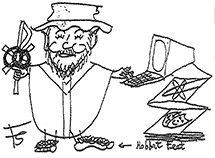The story of Jesus is the story of a man who risked his life for the sake of truth. His chief disciples were less committed to risk until he set the example. But there were least two senior members of the social establishment who urged caution in the community leaders’ dealing with this risky man.
One was Nicodemus, who had had a famous conversation with Jesus. About Jesus he cautioned “Does our law judge a man without first giving him a hearing and learning what he does?” (“Gospel of John” Chapter 7, verse 51)
The other was Gamaliel, who appears in the Acts of the Apostles and concerning the movement of Jesus’ disciples cautioned: “So in the present case I tell you, keep away from these men and let them alone; for if this man or this undertaking is of men, it will fail; but if it is of God, you will not be able to overthrow them. You might even be found opposing God!” (Acts of the Apostles 5, 34-9).
Is it not true that many people condemn other people and ideas, even religions, without really giving them a hearing? We have discovered how beautiful are the depths of faith in many Muslims, Hindus and Buddhists we have come to know; yet a common view of an entirely hostile Islam after 9/11 has been shown to be false. It is often true of believers that they have not given other believers a hearing. It is also true of non-believers.
Jumping to conclusions is also a feature of some members of the scientific community. Some people of science get worried when some of their own, trained in their own ways and claiming their own credentials, venture to write books which either provide more comprehensive summaries than scientific disciplines allow, or venture on to new theoretical pathways which seem to be validated inadequately . Such an adventurer is the plant physiologist and writer, Rupert Sheldrake (A New Science of Life, 1981). Better known is the scientist Lovelock who proposed a total Earth being he called “Gaia.”
I was put on to Sheldrake by an account of his theory of “formative causation”. It was an interesting speculative theory in itself, but what led me to buy the first book (hard cover, full price) was that the prestigious scientific journal Nature had recommended that Sheldrake’s book should be burnt!
From then on I looked carefully in any new comprehensive scientific writing to see whether the authors had even mentioned other scientists whose views differed radically from their own. Was there a writer extolling the beauties of symmetry in physics? Then what did that one make of the function of symmetry-breaking? Was the book looking vigorously at cosmology and thermodynamics? Then, did the author mention Prigogine and dissipative structures? Surely the scientific community needs to police, not only pseudoscience, but the openness and honesty of its own prestigious writers.
It is a matter of record that the establishment has acted to suppress the writings of dissidents and fringe writers. Such action might well be called “logicide” - killing the word. They would have been well advised to follow the teaching of Gamaliel, which translated into non-theological terms would read:
Keep clear of this oppression: leave it alone. If this idea is not of the truth, it will collapse; but if it is of the truth, you will never be able to defeat it, and you risk finding yourselves at war with the truth .
This is the Gamaliel caution. We all, citizens, church folk, scientists, should heed it.

